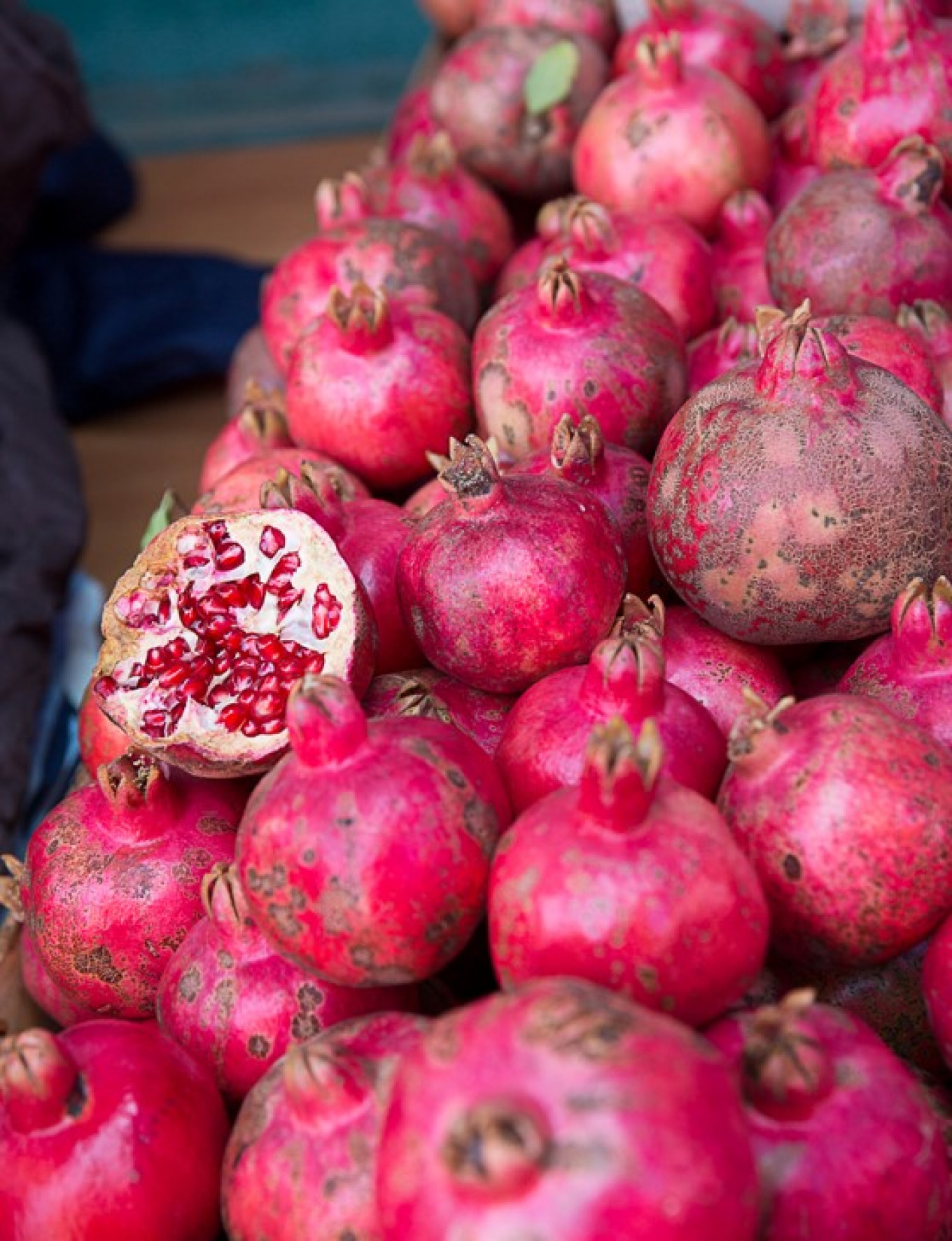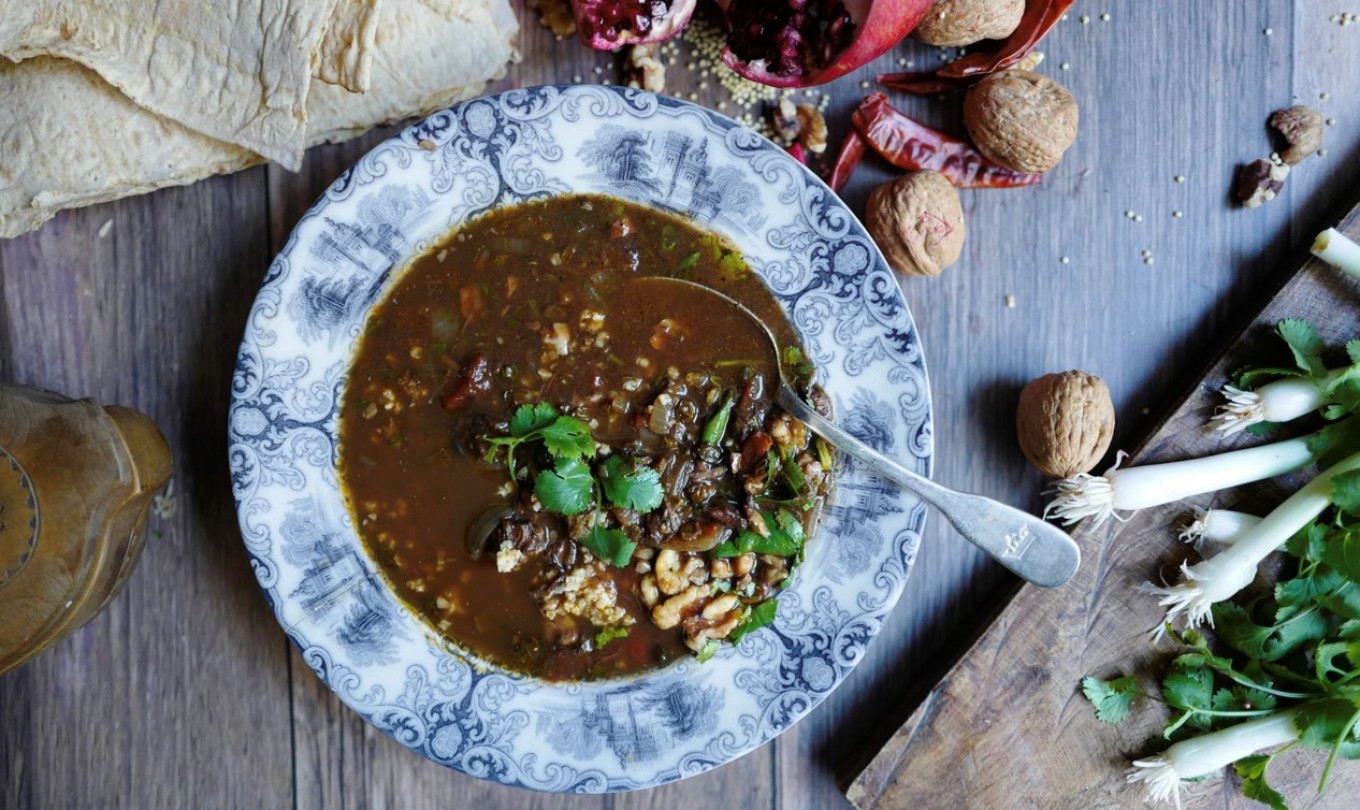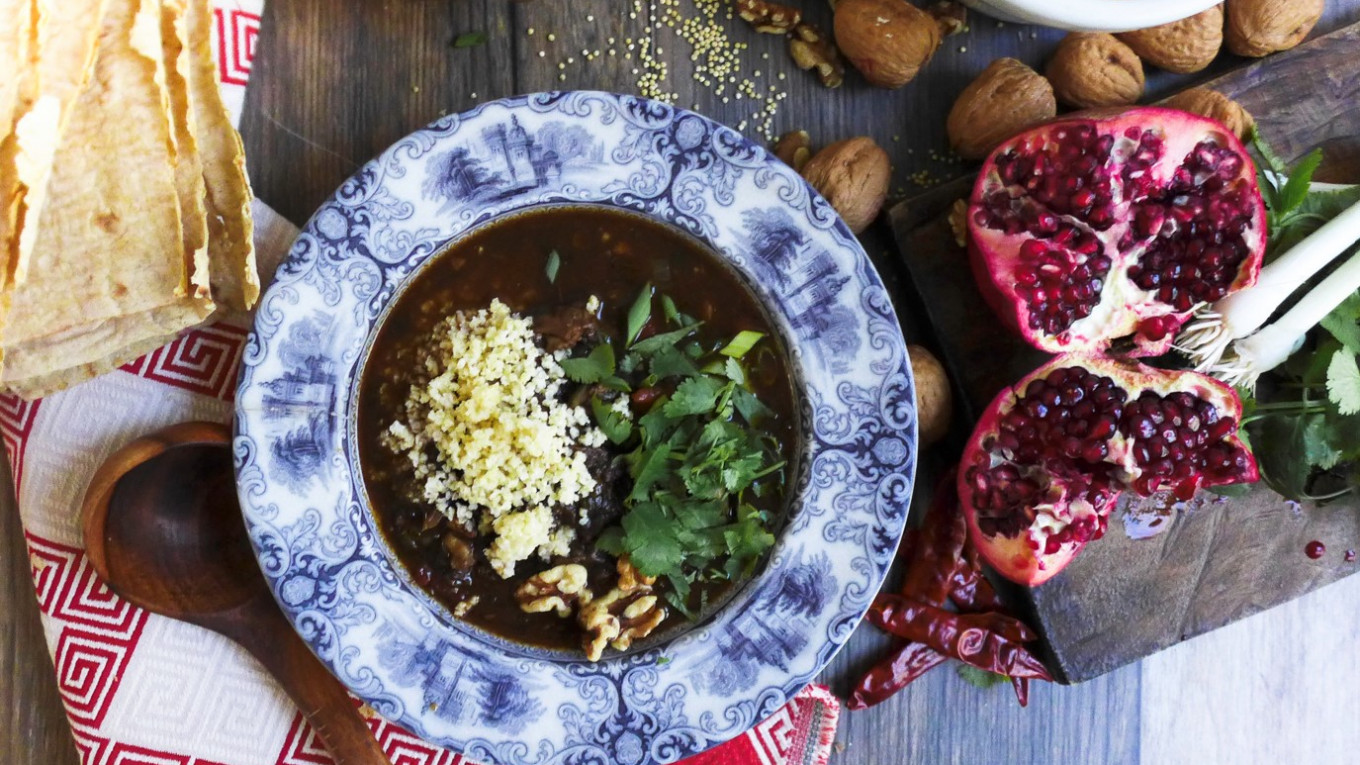Winter weather dominated the headlines this week as a freak snowstorm brought Washington D.C. to its knees, a fact that didn’t go unnoticed by Moscow’s veteran expatriates, who greeted the 19-hour delays on I-95 with wry amusement, as they trudged through yet another daily deluge of snow that has become the norm in the Russian capital over the past week.
You never get snow days in Russia; when faced with a daily meter of fresh snow, Russians merely button up their fur coats as high as they will go, clap on their hats and struggle on, hoping that at the end of their day, there will be a pot of something steamy hot on the stove to help thaw them out.
It was with this hope in mind that I struggled through the cold to the market to gather supplies for the first pot of soup of 2022. As I slipped and slid along the icy sidewalk, I had in mind a golden chicken soup with handmade egg noodles, spiked with salted green onions and pickled peppers, but all thoughts of this vanished when I caught sight of a row of plump lamb shanks lined up on the butcher’s block. A rush of adrenaline later, I was busy sourcing walnuts, cilantro, beef bones for stock, and a curious commodity known as fruit leather: rubbery sheets of dried fruit pulp, popular all over the former Soviet Union. I mentally braced myself for a two-day cooking marathon, the result of which would be a heavenly dish that contained more than a hint of the sun in it. This is kharcho, Georgia’s beloved sweet and sour soup, as certain to warm the body as it is to fuel the soul.

I feel on firm ground kharcho, to which I turn when I feel an urge to impress. Invited to cook for Moscow’s International Women’s Club one January following their regularly scheduled three-hour Nordic walks through Sokolniki Park, I put all my chips on a large pot of kharcho and some just-baked Uzbek bread and cashed in mightily. I have never seen a pot of soup disappear so quickly; and each International Woman scrambling for seconds asked, “what on earth is in this?”
Kharcho combines many of the foundational flavors of Caucasian cuisine: lamb, tomatoes, the tangy sweetness of jewel-toned fruit leather, and the signature spices of coriander, blue fenugreek, basil, summer savory, parsley, marigold, and mint in khmeli suneli, Georgia’s most popular spice blend. The heat of kharcho comes from the region’s favorite chili paste, adjika, which mingles with the sweetness of the fruit leather and pomegranate juice and syrup, in a rich broth, with each element deliciously distinct.
The debate over the meat base of kharcho will continue to rage long after I am gone. I’ve had great versions with beef, mutton, and lamb, though I’m convinced that you can’t beat lamb shanks for flavor and texture. Rice is often used as the starch in kharcho, though I vastly prefer the more traditional millet, with its fluffy texture and nutty taste, which echoes the tiny slivers of walnut bobbing in the soup.
You can’t hurry kharcho: lamb shanks need a long braise to turn them delectably tender, and if you are going to spend the time on the lamb, you might as well simmer up some homemade beef stock at the same time. Then you need to bring all the elements together in the broth: the tangy sweetness of the fruit leather softens the acidity of tomatoes in a long simmer, thickened with the braising liquid. These consecutive steps usually take me two days, with time for the braising liquid to chill. But the result is magic: poured over a mound of fluffy millet and garnished with a generous handful of fresh cilantro and other fresh herbs, this is slightly more than a soup and just a bit less than a stew. Add chewy flatbread and you have a meal you won’t soon forget!

Kharcho
Ingredients
- 2 large or 4 small lamb shanks (about 1 kilo or two pounds of meat)
- ¼-cup (60 ml) + 2 Tbsp olive oil
- 1 head of garlic, sliced in half + 5 cloves of garlic, finely chopped
- 2 yellow onions, finely chopped
- 2 quarts (2 liters) beef stock
- 2 cups (475 ml) robust red wine
- One 14-oz (410 ml) tin of chopped tomatoes
- 2 Tbsp tomato paste
- 1 Tbsp salt and pepper
- 2 large red bell peppers, chopped into a fine dice
- ¼-cup (60 ml) adjika
- 5-oz (100 grams) fruit leather sliced into small pieces (substitute the same amount of dried prunes, rehydrated with hot water and 25 grams of tamarind paste)
- ½-tsp paprika
- ½-tsp cayenne pepper
- 2 Tbls khmeli-suneli
- 1 Tbls fenugreek seeds, crushed
- 2 cups (475 ml) pomegranate juice
- ¼-cup (60 ml) pomegranate syrup
- 1 cup (235 ml) finely chopped walnuts
Serve with
- Cooked millet*
Garnish with
- Freshly chopped cilantro, mint, and parsley
- Freshly chopped scallions
- More chopped walnuts
Instructions
- Heat ¼-cup (60 ml) of the olive oil over medium high heat in a large, heavy-bottomed soup pot or Dutch oven. Salt and pepper the lamb shanks well, then sear them on each side until they are well browned.
- Remove the shanks to a plate, then lower the heat to medium. Pour the red wine into the pot and use the back of a wooden spoon to scrape up all the bits clinging to the bottom of the pan. Add the tomato paste and whisk to combine. Simmer until the mixture is reduced by half.
- Return the lamb shanks to the pot, then add the two halves of the garlic head, a quarter of the chopped onions, the chopped tomatoes, and enough of the beef stock so that the shanks are halfway covered. Bring the pot to a gentle simmer, then lower the heat as far as it will go, cover the pot tightly and allow the shanks to braise for 2-3 hours until the meat is falling off the bones. You can also do this in an oven set to 200ºF (95ºC). Check every 30 minutes to be sure that the liquid has not evaporated. Top up with more beef stock as needed.
- Remove the shanks from the braising liquid and use a fork to remove the lamb from the bones, then set the meat aside. Fork the lamb into bite-sized pieces. Remove the fat from the braising liquid by chilling it overnight or using a degreaser to separate the fatty liquid. Do not throw away the shank bones or the garlic head!
- Wipe out the pot and heat the remaining 2 Tbls of olive oil in it. Sauté the remaining onions until translucent. Then add the chopped garlic, bell peppers and sauté for a further 5-7 minutes until everything is quite limp. Sprinkle the mixture with the paprika and cayenne pepper and stir to combine. Then add the khmeli-suneli, fenugreek, and salt.
- Add the braising liquid and its solids, the remainder of the stock, the pomegranate juice and syrup to the pot and bring to a simmer. Add the lamb and lamb bones, the fruit leather, adjika, and the walnuts and stir well to combine. Cover and simmer over low heat for 45 minutes.
- While the soup is simmering, toast the millet in vegetable or olive oil until it is shiny, and a few grains “pop.” Pour 1-¾ (410 ml) cups of water for every cup (235 ml) of millet with a pinch of salt. Simmer until the millet has absorbed all the liquid. Fluff the grains up.
*Do not put the millet directly into the soup pot. Spoon hot soup over the cooked millet in the soup bowl to avoid the millet turning gummy and absorbing too much of the soup. Store the surplus millet and soup separately.
To serve the soup: discard the lamb bones and garlic husk, then place ½-cup of millet into a shallow soup bowl and ladle the hot kharcho over the grains. Top with fresh cilantro and other herbs, sliced scallions, and a few chopped walnuts. Serve with chewy flat or lavash bread and a good Georgian wine.

A Message from The Moscow Times:
Dear readers,
We are facing unprecedented challenges. Russia's Prosecutor General's Office has designated The Moscow Times as an "undesirable" organization, criminalizing our work and putting our staff at risk of prosecution. This follows our earlier unjust labeling as a "foreign agent."
These actions are direct attempts to silence independent journalism in Russia. The authorities claim our work "discredits the decisions of the Russian leadership." We see things differently: we strive to provide accurate, unbiased reporting on Russia.
We, the journalists of The Moscow Times, refuse to be silenced. But to continue our work, we need your help.
Your support, no matter how small, makes a world of difference. If you can, please support us monthly starting from just $2. It's quick to set up, and every contribution makes a significant impact.
By supporting The Moscow Times, you're defending open, independent journalism in the face of repression. Thank you for standing with us.
Remind me later.







